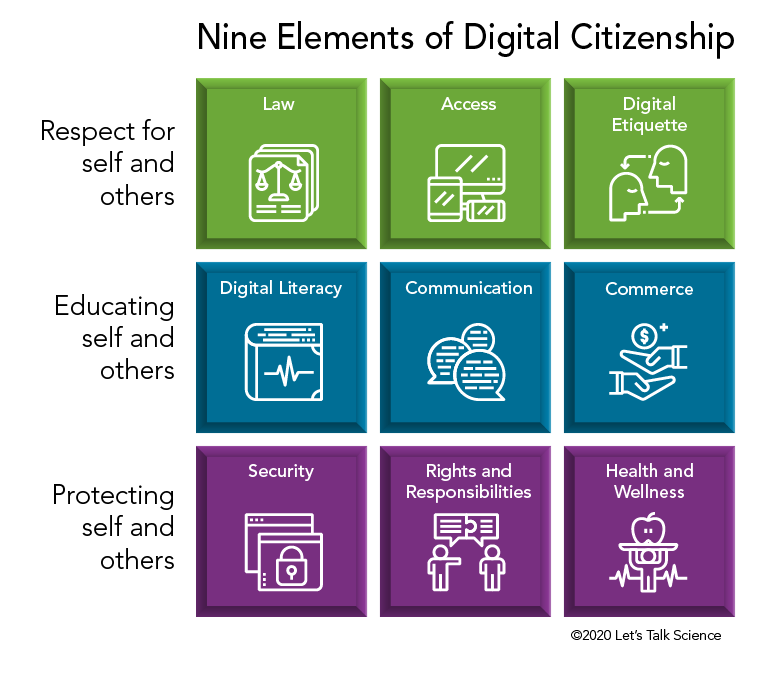The BCTF Code of Ethics and the second BCTC Professional Standard expect teachers to be role models in and out of the classroom (BCTC, 2019). Teachers need to be good citizens and this extends to the digital domain with today’s 21st century society. By explicitly teaching what good digital citizenship is and how to do it, teachers can better prepare their students for life after graduation. Digital citizenship is about thinking critically, behaving safely, and participating responsibly and ethically in the digital world (Let’s Talk Science, 2022). So how do we do this?
Mike Ribble (As cited in Let’s Talk Science, 2022) outlines nine themes needed for good digital citizenship. The first three are to respect others through law, access and digital etiquette. The next three include promoting education in digital literacy, commerce and communication. The final three involve protecting ourselves through digital security, understanding our digital rights and responsibilities, and ensuring our health and wellness when using technology. By following these good digital citizenship themes, we can lead and assist others in building positive digital experiences, recognize that our actions have consequences to others, and act in a manner for the common good (Ribble, 2017).
The need to show respect for others resonates with me. Good digital citizens understand the legal ramifications of cyber crime. In the UK, there have been cases of elementary and high school students hacking school computer systems, but because they are still children, they do not understand the ramifications of their actions (Cluley, 2020). Cyber-bullying has now surpassed bullying as the most common type of harassment (Gordon, 2020). Children might feel empowered to cyber-bully when they think their identity is “anonymous.” Plagiarism is also easier to do now thanks to the World Wide Web. I think one way for students to avoid plagiarism, is to teach and use a citation standard such as APA or MLA in schools prior to graduating high school. At the post-secondary level, students will need these citation skills to write essays, and publish their research in journals.
Another theme I support is schools should always provide universal access to technology to all students for an equitable classroom. This may not always be possible due to funding, but it should be a goal for society. If I cannot ensure equity in technology with my students, I would likely look for aw way to not use it. Polite and respectful digital etiquette online is the third element of ensuring good digital citizenship. Typically, social trolling is rampant online due to user anonymity, and can ruin any positive learning or entertaining experience. In my opinion, this is also a form of cyber-bullying. Students must learn that they can rarely ever undo something once they post something online. Hollywood directors have lost jobs over past questionable tweets. Online discourse is tricky as what is considered to be social acceptable or ethical today might not be in the future as social values can change over time.
References
BCTC. (2019). Professional standards for BC educators.
Cluley, G. (Jan., 2020) Nine-year-old kids are launching DDoS attacks against schools.
Gordon, S. (Jun., 2020). Cyber-bullying surpasses bullying as most common type of harassment.
https://www.verywellfamily.com/how-common-is-cyberbullying-4570942
Let’s Talk Science. (2022). Digital citizenship & ethics. https://letstalkscience.ca/educational-resources/backgrounders/digital-citizenship-ethics
Ribble, M. (2017) Digital citizenship. Nine Elements.

The nine elements of digital citizenship (©2020 Let’s Talk Science).
Photo Source: https://letstalkscience.ca/educational-resources/backgrounders/digital-citizenship-ethics
